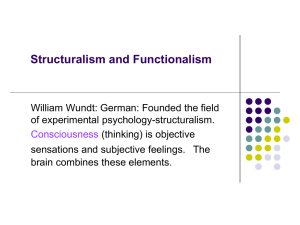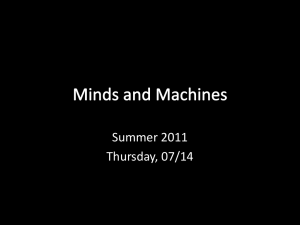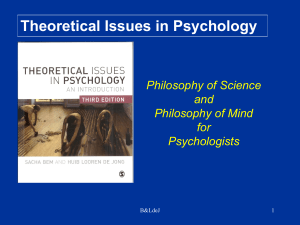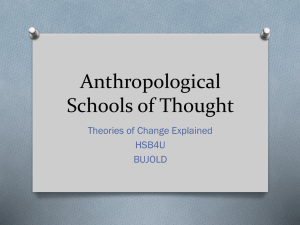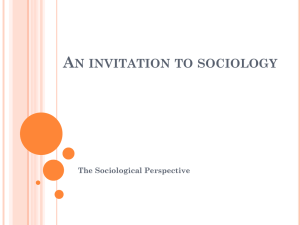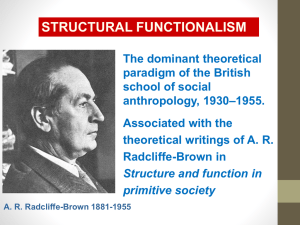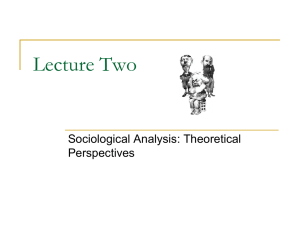File - Taylor Davis
advertisement
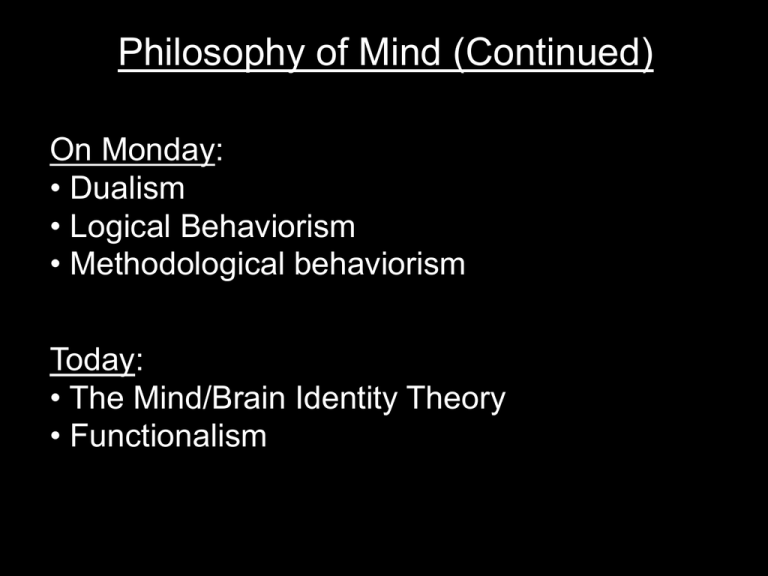
Philosophy of Mind (Continued) On Monday: • Dualism • Logical Behaviorism • Methodological behaviorism Today: • The Mind/Brain Identity Theory • Functionalism The Mind/Brain Identity Theory Water = H2O Mind = Brain The Mind/Brain Identity Theory Water = H2O Mind = Brain This is a conclusion reached by science. You can’t tell what the mind is just by thinking really hard, as Descartes’ and Ryle’s arguments assumed. The Mind/Brain Identity Theory Materialism: All physical events have physical explanations, including human behavior. The Materialist Slogan: No mental difference without a physical difference The Materialist Slogan: No mental difference without a physical difference Materialism: There must be some physical difference between someone who loves jazz and someone who hates jazz. Dualism: Someone who loves jazz could be physically identical to someone who hates jazz. The Materialist Slogan: No mental difference without a physical difference According to Identity Theory: Dualism gets more and more implausible as we learn more about the nervous system. The Materialist Slogan: No mental difference without a physical difference According to Identity Theory: Dualism gets more and more implausible as we learn more about the nervous system. Dualism made sense before we had any way of knowing which physical differences correlated with loving jazz. Now we know. 2,000 years ago, Lucretius was a materialist before it was cool. He believed that the mind is part of the body, so when the body dies, the mind does too. But Lucretius thought the mind was more like a hormone—a chemical substance. 2,000 years ago, Lucretius was a materialist before it was cool. He believed that the mind is part of the body, so when the body dies, the mind does too. But Lucretius thought the mind was more like a hormone—a chemical substance. Since then, the materialist account of the mind has gotten much better. In the same manner, the materialist account of lightning has also improved. In Lucretius’s time, many seriously believed that lightning was made by Zeus. This was not just a cute story. In the same manner, the materialist account of lightning has also improved. In Lucretius’s time, many seriously believed that lightning was made by Zeus. This was not just a cute story. At the time, this was literally the best explanation for lightning and thunder. According to Identity Theory: The materialist account of the mind has gotten a lot better, just as the materialist account of lightning has gotten a lot better. According to Identity Theory: The materialist account of the mind has gotten a lot better, just as the materialist account of lightning has gotten a lot better. Indeed, materialism is now the best explanation for both kinds of events. Like Lucretius, we may not know exactly which physical event correlates with each and every mental event, but we can safely conclude that some physical event correlates with each and every mental event. Like Lucretius, we may not know exactly which physical event correlates with each and every mental event, but we can safely conclude that some physical event correlates with each and every mental event. Identity between mind and brain is offered as the best explanation for these correlations. The best explanation for correlations between mental events and neurological events is identity: The best explanation for correlations between mental events and neurological events is identity: Why is activity in a specific part of the brain always correlated with the enjoyment of jazz? Because that’s what it is to enjoy jazz: activity in that part of the brain just is the enjoyment of jazz. The best explanation for correlations between mental events and neurological events is identity: Why is activity in a specific part of the brain always correlated with the enjoyment of jazz? Because that’s what it is to enjoy jazz: activity in that part of the brain just is the enjoyment of jazz. Do you agree with this? activity in that part of the brain just is the enjoyment of jazz. According to Identity Theory: Dualism is like Vitalism. Both theories posit some special substance as the best explanation for something, but we can now explain those same observations without positing that substance. Vitalism: There is a physical substance—a “vital fluid”— found only in living things. It is the best explanation for what living things all share, and for the differences between living and non-living things. Vitalism: There is a physical substance—a “vital fluid”— found only in living things. It is the best explanation for what living things all share, and for the differences between living and non-living things. Dualism: There is a non-physical substance—a “soul”— found only in humans. It is the best explanation for mental events. Vitalism posits a physical substance, while Dualism posits non-physical substance. Vitalism posits a physical substance, while Dualism posits non-physical substance. Still, Identity Theory says, both posits are superfluous. Identity Theory: The concept of a soul does no explanatory work. (Like the concept of “vital fluid”) Identity Theory: The concept of a soul does no explanatory work. (Like the concept of “vital fluid”) We need a materialist theory anyway, to explain physical things. This same theory can now explain everything Dualism was supposed to explain, but without positing any special substances. Identity Theory: The materialist theory of the mind is a better explanation for mental events than dualism. Identity Theory: The materialist theory of the mind is a better explanation for mental events than dualism. What makes it better? Identity Theory: The materialist theory of the mind is a better explanation for mental events than dualism. What makes it better? Parsimony. We need a materialist theory anyway. We need to explain physical phenomena regardless of what we say about mental phenomena. If this same theory can also explain all mental phenomena, then why bring in some different, additional theory to explain those phenomena? Materialism explains both physical phenomena and mental phenomena, in one unified theory. Dualism only explains mental phenomena. Materialism explains both physical phenomena and mental phenomena, in one unified theory. Dualism only explains mental phenomena. All else being equal, a theory that both explains and unifies provides a better explanation than one that just explains, without unifying. Materialism explains both physical phenomena and mental phenomena, in one unified theory. Dualism only explains mental phenomena. All else being equal, a theory that both explains and unifies provides a better explanation than one that just explains, without unifying. Thus, materialism provides a better explanation for mental events than dualism. Materialism explains both physical phenomena and mental phenomena, in one unified theory. Dualism only explains mental phenomena. All else being equal, a theory that both explains and unifies provides a better explanation than one that just explains, without unifying. ??? Thus, materialism provides a better explanation for mental events than dualism. In Groups: Provide support for this premise. Why is a unifying theory better than a non-unifying theory? All else being equal, a theory that both explains and unifies provides a better explanation than one that just explains, without unifying. ??? By definition, non-unified theories employ novel concepts, which can’t be defined in terms of concepts we are already committed to. By definition, non-unified theories employ novel concepts, which can’t be defined in terms of concepts we are already committed to. The Principle of Parsimony Only posit novel concepts when you really have to, because your existing concepts can’t do the job. According to Identity Theory, existing concepts can do the job. The Principle of Parsimony Only posit novel concepts when you really have to, because your existing concepts can’t do the job. In Groups: Do you agree that we should only posit novel concepts when our existing concepts prove inadequate? Are parsimonious theories more likely to be true, or is parsimony good for some other reason? (Recall the justification of induction...) Functionalism Functionalism Functionalism shares the Identity Theory’s commitment to materialism, and its rejection of dualism. However, it also finds problems with the Identity Theory. Functionalism Functionalism agrees with Identity Theory that every token mental state is identical with some token brain state. But it disagrees that every type of mental state is identical with some type of brain state. What does this mean? Tokens vs. Types Tokens: particular, specific, concrete instances. Example: the particular instance of redness displayed by a particular apple Types: general kinds, or properties, which may take many different instances. Example: the property of being red in general. Tokens vs. Types Tokens: particular, specific, concrete instances. My homesickness, when I was at summer camp at age 10, is a token mental state. Types: general kinds; properties that may have many different instances. Homesickness in general, across all particular instances, is a mental type. Functionalism agrees that token mental states are identical with token brain states. My homesickness, when I was at summer camp at age 10, was identical with a certain state of my brain at the time. Functionalism agrees that token mental states are identical with token brain states. My homesickness, when I was at summer camp at age 10, was identical with a certain state of my brain at the time. But it denies that types of mental state are identical with types of brain state. Homesickness in general is not identical with any one type of brain state. According to Functionalism: Psychological types, or properties, can be realized in multiple ways. According to Functionalism: Psychological types, or properties, can be realized in multiple ways. Multiple Realizability sounds complicated, but it’s very simple. It just means that a property or type can be instantiated in physically different ways. A wooden spoon and a metal spoon are physically different, but they’re still instances of the same type: spoon. According to Functionalism: Psychological types, or properties, can be realized in multiple ways. Just as two objects can be physically different and yet both be spoons, two mental states can be physically different and yet both be instances of the same kind of mental state. There were probably a few physical differences between E.T.’s nervous system and our nervous systems. Still, isn’t E.T. capable of homesickness, just as we are? Isn’t that type of mental state still the best explanation of his behavior? Why would physical details about how homesickness is realized make any difference? Still, isn’t E.T. capable of homesickness, just as we are? Isn’t that type of mental state still the best explanation of his behavior? Why would physical details about how homesickness is realized make any difference? Homesickness is a mental type that can be realized within different physical systems. If Michael Jackson can get homesick, so can E.T. It doesn’t matter what their brains are like. According to functionalism, mental states are defined by their functions (like spoons). And functions are multiply realizable. According to functionalism, mental states are defined by their functions (like spoons). And functions are multiply realizable. Functions are defined by goal-states—what matters is just that some goal is achieved. It doesn’t matter how the goal achieved. Wooden spoons and metal spoons both achieve the goal of scooping food, so they’re both spoons. Likewise, a heart and a pacemaker perform the same function, but in physically different ways. Likewise, a heart and a pacemaker perform the same function, but in physically different ways. Functionalism implies that it’s possible (in principle) to have ”mental pacemakers”— artificial brain systems that perform the functions of the mind. Likewise, a heart and a pacemaker perform the same function, but in physically different ways. Functionalism implies that it’s possible (in principle) to have ”mental pacemakers”— artificial brain systems that perform the functions of the mind. As long as artificial systems perform the functions of the mind, they are the mind. So Functionalism makes an identity claim of its own: Mental states and processes are identical to the functional properties of the brain. Mind = “design facts” of the brain Mind/Brain Identity: mental states and processes are identical to the physical properties of the brain. Mind/Brain Identity: mental states and processes are identical to the physical properties of the brain. Functionalism: mental states and processes are identical to the functional properties of the brain. Mind/Brain Identity: mental states and processes are identical to the physical properties of the brain. To instantiate the same mental state, you must instantiate the same physical properties. Functionalism: mental states and processes are identical to the functional properties of the brain. Mind/Brain Identity: mental states and processes are identical to the physical properties of the brain. To instantiate the same mental state, you must instantiate the same physical properties. Functionalism: mental states and processes are identical to the functional properties of the brain. So anything that performs these functions can count as a mental state or process—it doesn’t have to be a brain at all. anything that performs these functions can count as a mental state or process—it doesn’t have to be a brain at all. As long as artificial systems perform the functions of the mind, they are the mind. anything that performs these functions can count as a mental state or process—it doesn’t have to be a brain at all. As long as artificial systems perform the functions of the mind, they are the mind. Artificial intelligence—along with the rest of cognitive science—is based on functionalism. anything that performs these functions can count as a mental state or process—it doesn’t have to be a brain at all. Discuss: Suppose a woman is in a car accident, and suffers brain damage. As a result, she loses the ability to add and subtract. Now suppose neurosurgeons implant a calculator directly in her brain, so she’s able to add and subtract again. Are the activities of the calculator literally the woman’s own mental processes? Functionalism in Different Fields On Monday we discussed the difference between psychology and philosophy of mind, and I just said that cognitive science is founded on functionalism. So let’s consider how functionalism fares in each of these three separate fields: 1) Cognitive Science 2) Psychology 3) Philosophy of Mind Functionalism in Different Fields First, what was the difference between psychology and philosophy of mind? Functionalism in Different Fields First, what was the difference between psychology and philosophy of mind? Philosophy has a wider scope than psychology: While psychology is limited to questions about how the mind predicts and explains behavior, philosophy can address any question about the mind. Functionalism in Different Fields Now, what is the difference between psychology and cognitive science? Functionalism in Different Fields Now, what is the difference between psychology and cognitive science? Cognition = representation Cognitive science, too, is limited to explanation and prediction—it’s a science, after all. But it doesn’t focus on behavior. Computer science is cognitive science, because it’s based on using representations (symbols of code). Functionalism in Different Fields Last, (to be thorough) what is the difference between cognitive science and philosophy? Functionalism in Different Fields Last, (to be thorough) what is the difference between cognitive science and philosophy? Again, philosophy is wider in scope. Cognitive science is limited to the role of representations in explaining and predicting things. Philosophy can ask any kind of question about representations. Functionalism in Different Fields Cognitive science doesn’t actually need to address questions about the mind at all. You can build a robot whether or not you believe that the robot truly has a mind, and whether or not you think its cognitive operations are genuinely mental operations. Functionalism in Different Fields Cognitive science doesn’t actually need to address questions about the mind at all. You can build a robot whether or not you believe that the robot truly has a mind, and whether or not you think its cognitive operations are genuinely mental operations. Still, all of cognitive science is based on the functions of representations. Functionalism in Different Fields So cognitive science is based on a functionalist notion of cognition. It’s a separate question whether this view of cognition should also be the basis for our concept of mind. Functionalism in Different Fields So cognitive science is based on a functionalist notion of cognition. It’s a separate question whether this view of cognition should also be the basis for our concept of mind. This is not a question of prediction. Functionalism in Different Fields So cognitive science is based on a functionalist notion of cognition. It’s a separate question whether this view of cognition should also be the basis for our concept of mind. This is not a question of prediction. Whether the mind is identical with functional states is a question for philosophy, not cognitive science. Functionalism in Different Fields What about functionalism in psychology? Functionalism in Different Fields What about functionalism in psychology? Psychology is mostly based on functionalism. In my opinion, it should be entirely based on functionalism. Functionalism in Different Fields Good psychology (my opinion): Jack recognized Jill because in his mind there is a system with the function of face-recognition. The system has this function for the same reason that Jack’s heart has its function: natural selection. We explain behavior by positing systems that have functions. Functionalism in Different Fields In practice, however, much of psychology is devoted simply to observing behavior, without really explaining it. CLAIM: People have a “need for mystery” that causes them to resist scientific explanations. Is this an explanation, or just a description? Functionalism in Different Fields In practice, however, much of psychology is devoted simply to observing behavior, without really explaining it. CLAIM: People have a “need for mystery” that causes them to resist scientific explanations. Is this an explanation, or just a description? The mind does not contain a Need-for-Mystery System, with a function determined by selection. Functionalism in Different Fields What about functionalism in philosophy of mind? Since philosophy can ask any question about the mind, I think it identifies some questions that functionalism doesn’t answer very well. The biggest one is the question of conscious experience. Chalmers (1995): “The really hard problem of consciousness is the problem of experience. When we think and perceive, there is a whir of information-processing, but there is also a subjective aspect. As Nagel (1974) has put it, there is something it is like to be a conscious organism. This subjective aspect is experience.... Why is it that when our cognitive systems engage in visual and auditory information-processing, we have visual or auditory experience: the quality of deep blue, the sensation of middle C?” Chalmers (1995): “The really hard problem of consciousness is the problem of experience. When we think and perceive, there is a whir of information-processing, but there is also a subjective aspect. As Nagel (1974) has put it, there is something it is like to be a conscious organism. This subjective aspect is experience.... Why is it that when our cognitive systems engage in visual and auditory information-processing, we have visual or auditory experience: the quality of deep blue, the sensation of middle C?” How can knowledge of functional systems explain what mental events feel like to the subject? Functionalism in Different Fields We can implant a calculator in someone’s brain, thereby restoring the informationprocessing functions of addition and subtraction. But what could this tell us about what it’s like, from the woman’s subjective point of view, to do addition and subtraction with an implant? Scientific explanations of behavior are objective, not subjective. We can’t observe and measure what it’s like to experience things. Yet, the ordinary, common-sense concept of the mind often involves features of subjective experience. Imagine your doctor saying this: “Objectively, this is going to hurt. You’ll probably contort your face and scream out loud. But don’t worry. There’s no evidence that you’ll actually feel anything from the subjective point of view.” So functionalism seems to work beautifully in science. (Even better than many psychologists recognize.) So functionalism seems to work beautifully in science. (Even better than many psychologists recognize.) But when we start asking non-scientific questions about the mind—questions that aren’t about predicting observable behavior—it’s not clear that functionalism fares as well. The “Big” Essays and the review session are due next Wednesday.
